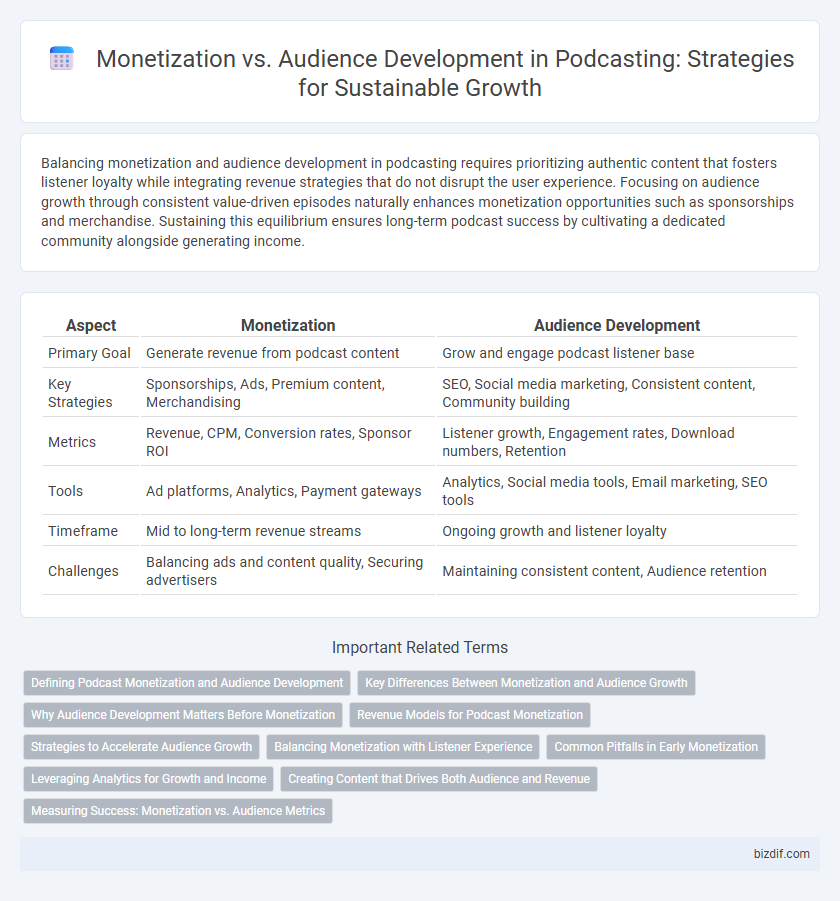Balancing monetization and audience development in podcasting requires prioritizing authentic content that fosters listener loyalty while integrating revenue strategies that do not disrupt the user experience. Focusing on audience growth through consistent value-driven episodes naturally enhances monetization opportunities such as sponsorships and merchandise. Sustaining this equilibrium ensures long-term podcast success by cultivating a dedicated community alongside generating income.
Table of Comparison
| Aspect | Monetization | Audience Development |
|---|---|---|
| Primary Goal | Generate revenue from podcast content | Grow and engage podcast listener base |
| Key Strategies | Sponsorships, Ads, Premium content, Merchandising | SEO, Social media marketing, Consistent content, Community building |
| Metrics | Revenue, CPM, Conversion rates, Sponsor ROI | Listener growth, Engagement rates, Download numbers, Retention |
| Tools | Ad platforms, Analytics, Payment gateways | Analytics, Social media tools, Email marketing, SEO tools |
| Timeframe | Mid to long-term revenue streams | Ongoing growth and listener loyalty |
| Challenges | Balancing ads and content quality, Securing advertisers | Maintaining consistent content, Audience retention |
Defining Podcast Monetization and Audience Development
Podcast monetization involves generating revenue through sponsorships, advertising, premium content, merchandise sales, and listener donations, emphasizing strategies to convert audience engagement into financial gain. Audience development focuses on growing and nurturing a loyal listener base by optimizing content distribution, enhancing discoverability, and fostering community interaction. Effective podcast success relies on balancing monetization methods with sustainable audience growth to maximize both income and reach.
Key Differences Between Monetization and Audience Growth
Monetization in podcasting involves strategies like sponsorships, ad placements, and premium subscriptions to generate revenue, while audience development focuses on expanding listenership through content quality, engagement, and marketing. Key differences include monetization's goal of direct financial return versus audience growth's emphasis on building a loyal and expanding listener base. Effective podcast success combines both approaches, using audience insights to optimize monetization opportunities without compromising content appeal.
Why Audience Development Matters Before Monetization
Building a loyal and engaged audience establishes a strong foundation essential for sustainable podcast monetization, as advertisers prioritize reach and listener engagement metrics. Focusing on audience development first ensures that content resonates with target demographics, resulting in higher retention rates and more organic growth through shares and word-of-mouth. Monetization strategies become more effective and scalable when based on a well-established, active listener base, rather than attempting to monetize prematurely and risking audience alienation.
Revenue Models for Podcast Monetization
Podcast monetization relies heavily on diverse revenue models such as sponsorship deals, dynamic ad insertion, and premium subscription services to generate consistent income streams. Audience development directly impacts these revenue models by increasing listener engagement, which attracts higher-value advertisers and boosts conversion rates for premium content offerings. Successful podcast revenue models combine data-driven audience insights and strategic content distribution to maximize monetization potential.
Strategies to Accelerate Audience Growth
Leveraging targeted content marketing and social media amplification drives rapid podcast audience growth more effectively than early monetization efforts. Prioritizing consistent episode releases and authentic listener engagement fosters loyalty and organic sharing, amplifying reach. Data-driven analysis of listener demographics and behavior enables strategic content adjustments that accelerate subscriber acquisition and retention.
Balancing Monetization with Listener Experience
Balancing monetization with listener experience requires integrating sponsorships and advertisements subtly to avoid disrupting content flow, thereby maintaining audience engagement. Effective monetization strategies include native advertising and exclusive content offerings that add value without alienating listeners. Prioritizing long-term audience growth ensures sustainable revenue streams through loyal, engaged listeners rather than immediate profit maximization.
Common Pitfalls in Early Monetization
Early monetization in podcasting often leads to common pitfalls such as alienating the audience with excessive ads and compromising content quality for quick revenue. Focusing too heavily on immediate income can stunt organic audience growth and reduce listener loyalty. Successful podcasters balance monetization strategies with consistent audience development to build sustainable, long-term engagement.
Leveraging Analytics for Growth and Income
Leveraging advanced podcast analytics enables creators to identify audience demographics, listening trends, and engagement hotspots, driving targeted monetization strategies. Data-driven insights allow for optimized ad placements and personalized content, increasing listener retention and revenue streams. Emphasizing both audience development and monetization through analytics fosters sustainable podcast growth and maximizes income potential.
Creating Content that Drives Both Audience and Revenue
Creating content that balances audience growth and monetization requires innovative storytelling tailored to target demographics while integrating strategic sponsorships and affiliate marketing. Leveraging listener data to refine topics and ad placements enhances engagement and revenue streams simultaneously. Consistent high-quality episodes foster loyalty, driving both expanding listenership and increasing monetization opportunities.
Measuring Success: Monetization vs. Audience Metrics
Measuring success in podcasting relies heavily on balancing monetization metrics, such as ad revenue, sponsorship deals, and listener donations, with audience development indicators like unique downloads, listener retention rates, and engagement levels. Revenue growth showcases financial viability, while audience metrics reveal content resonance and market reach. A comprehensive analysis of both sets of data enables podcasters to optimize content strategies and maximize profitability.
Monetization vs Audience development Infographic

 bizdif.com
bizdif.com